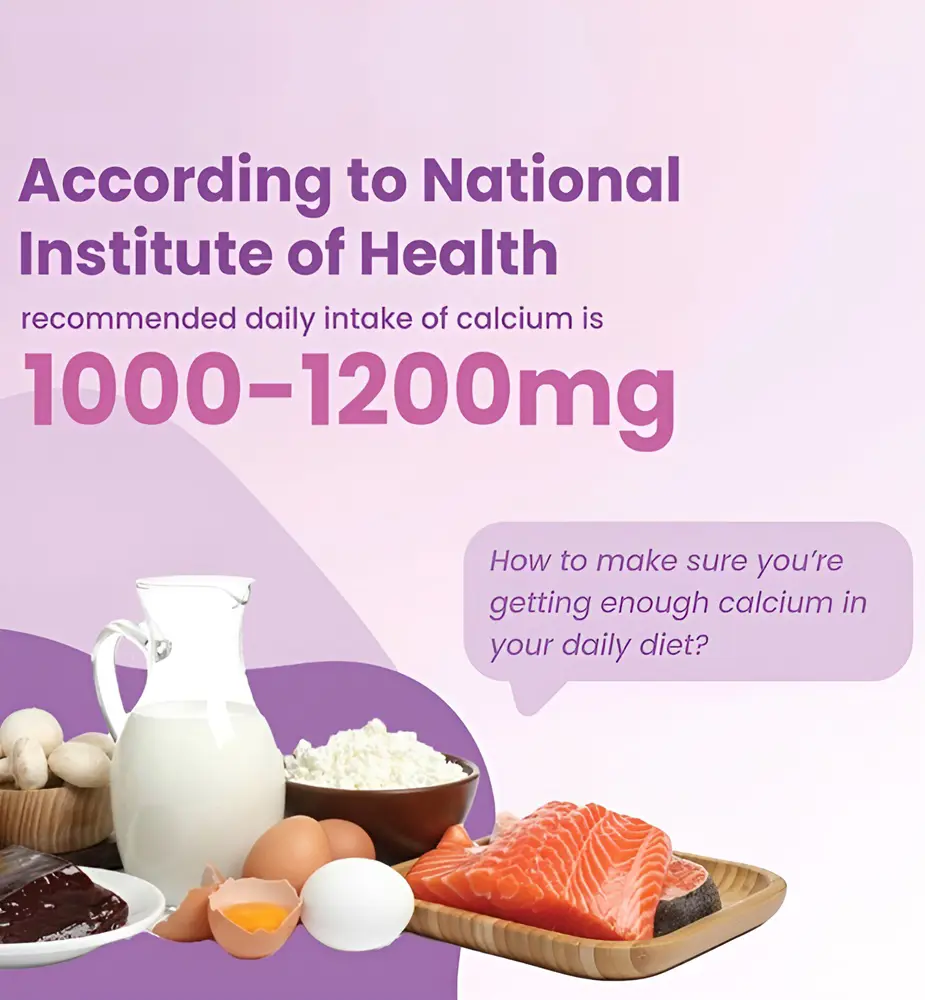How Much Calcium Is Actually Needed?

This post may contain affiliate links. If you make a purchase through links on our site, we may earn a commission.
Calcium is a mineral associated with bones, muscles and the nervous system in the body. Current dietary guidelines suggest different Recommended Dietary Allowances(RDAs) for adult males and females, with 1000mg being optimal for males and 1200mg for females.
Nevertheless, people may have specific demands, for instance, because of their age, sex, other lifestyles, and their nutrient intake pattern. Considering all these factors, this guide will unravel exactly how much of this compound we require in our daily diets, and how best to acquire it.
Recommended Daily Allowance For Calcium

The RDA of calcium differs by age and sex, indicating its importance as a mineral in the structure of bones and other processes. Several studies have recommended the use of 1000 mg and 1200 mg of calcium per day. The following section presents a comprehensive list of the daily advisable amount of calcium consumption depending on the age and certain conditions, as well as factors that affect calcium assimilation.
For Infants And Children
Infants
- 0-6 months: 200 mg
- 7-12 months: 260 mg
Children
- 1-3 years: 700 mg
- 4-8 years: 100mg
Adolescents
- 12-18 years: 1300 mg
Calcium is essential in stages in the development of the human body especially when one is young or in his adolescent stage. Teenagers require higher doses of calcium to enhance their bone mass and density during the growth development process.
For Adults

- 19-50 years: 1000 mg
- Women (50+ years): 1200 mg
- Men (70+ years): 1200 mg
The calcium taken will make the bones strong and also help the adults avoid osteoporosis which occurs most especially when people advance in age. Extra calcium is necessary for women above fifty years, and men above seventy years because the bone density reduces as people age.
For Pregnant And Lactating women
- 14-18 years: 1300 mg
- 19-50 years: 1000 mg
Pregnant and lactating women need to take more calcium to provide for the development of the skeleton of the fetus as well as to replenish calcium stores in the female body.
Special Considerations
People with hypoparathyroidism may require considerably higher calcium intake, usually accompanied by vitamin D to enhance absorption. Additionally, those suffering from chronic kidney disease may typically require careful management of calcium intake as they are highly exposed to the risk of hypercalcemia.
Individuals with these health conditions need to consult healthcare providers for personalized recommendations.
Role Of Calcium In The Body
Although people associate calcium mostly with the support of bone structures, it is one of the most complex biochemical active agents that play an important role in numerous physiological processes that are vital for any person. Here are the primary functions of calcium in the body:
Bone And Teeth Health

Normal calcium intake is essential to ensure good bone structure and strength to avoid osteoporosis and easy breaking of bones, conditions often linked with age. Besides, calcium is an essential part of tooth enamel–the white, outer covering of teeth. Proper mineralization of teeth is a crucial factor in achieving good groundwork for dental health, especially when teeth are developing.
Muscle Function
When the muscle receives a nerve impulse, calcium ions that are present within the muscle fibers are also released intracellularly. This calcium then reacts with the proteins present in the muscle cells and leads to contraction. When the muscle relaxes, the ions of calcium are taken back to the depot of the muscular tissue.
All these occur in every contraction cycle of a muscle which implies that calcium is required for both the voluntary and involuntary contractions of muscles including the heart. Any imbalance in calcium level either high or low has a direct relationship with heartbeats and is likely to produce deadly results.
Nerve Function

Calcium is an important mineral used by the organs of the body to make signals cross synapses- the gap between nerve cells. Calcium is used in nerve impulses, for processes like feeling, movement, and even thinking.
It also has a direct function in the discharge of neurotransmitter substances in the head. These include dopamine, serotonin, and glutamate which play a role in mood regulation, learning and memory correspondingly and respectively. Calcium abnormalities in the brain area are known to perturb with respect to cognition and mood.
Blood Clotting
As part of the clotting system, calcium enables the body to clot enough and prevent excessive bleeding whenever there is an injury. When the skin is cut or injured, several reactions occur in the blood to form a clot to close the wound. Calcium is required in the activation of several clotting factors which are proteins in the human body to form a clot.
How Much Calcium Is "Too Much"?
Defining the quantity of calcium considered excessive requires knowledge of the upper limit of calcium intake or the ULs. Several problems may result from taking too much calcium; however, this is more common with supplements than with natural food sources. Here are the key points regarding excessive calcium intake:
Recommended Upper Limit
The upper tolerable intake level (UL) refers to the calcium amount that one is allowed to take daily without developing some adverse negative effect on most people. Intakes above this level are thought to be deleterious to health influencing the body adversatively such as in instances of kidney stones, hypercalcemia and cardiovascular illnesses.
Here are the ULs for calcium intake, as recommended by the National Institutes of Health (NIH):
Infants
- 0-6 months: 1,000 mg per day
- 7-12 months: 1,500 mg per day
Children
- 1-3 years: 2,500 mg per day
- 4-8 years: 2,500 mg per day
- 9-18 years: 3,000 mg per day
Adults
- 19-50 years: 2,500 mg per day
- 51+ years: 2,000 mg per day
Consumption Of Calcium In The United States
Calcium consumption among Americans depends on dietary practices and intake of calcium supplements among the population segment. Here are the key findings regarding calcium intake:
Average Calcium Intake
According to data from the National Health and Nutrition Examination Survey (NHANES), the average daily calcium intake for adults is around 900 mg to 1,200 mg.
Sources Of Calcium

Of total calcium intake, 72% is consumed through dairy foods like milk, yogurt, and cheeses. Plain milk makes up approximately 19% of the total calcium consumption. Other important sources of calcium include mixed dishes like pizza and pasta (17%) and grains (12%).
Supplement Use
A cross-sectional study data indicates that around 26% of Americans aged 2 or older reported having taken dietary supplements containing calcium on a reference day. From these supplements, the average intake is about 521 mg. Supplementation is more commonly practiced among women over twenty years of age where 37% reported to have occasionally or often taken calcium supplements compared to 26% of men.
Trends Over Time
The consumption of calcium has been observed to have a general trend of rise from the mid-1990s with change ranging from 85 to 190 mg.
Contrary, the updated evidence indicates that there was a slight decrease in average calcium daily intake from 2009 to 2018, particularly among children between the ages of 2 to 18 years. One study indicated that 49% of children aged 4-18 years and 39% of the total population of people aged 4 and above have been predicted to be non-adherence to EAR for calcium from both food and supplements.
Overconsuming And Under-consuming Effects
It’s important to note that calcium should not be taken in large quantities or lacking tremendously since both conditions pose certain risks and may be lethal at times. So let’s turn our attention to what outcomes can be expected from either end of the spectrum.
Overconsuming Calcium

Calcium overload happens to be more common from calcium supplements rather than foods because it is virtually impossible to overdose with calcium depending on the food source. This can lead to a range of health problems including:
- Kidney Stones: Kidney stones are shaped by the union of calcium with other substances, such as oxalates, or phosphates, to become solidified and crystalline in form within the kidneys. These crystals may grow into stones large enough that they might obstruct the urinary tract resulting in pain, difficulty urinating, or even renal pathology.
- Cognitive And Neurological Effects: High levels of calcium in the body can cause some neurological disorders, including fatigue, confusion, memory impairments and depression or anxiety.
- Cardiovascular Issues: High calcium also can increase blood pressure and affect the normal functioning of the heart in equal measure because calcium is known to act on muscles including heart muscles. Sometimes it leads to irregular heartbeats as well as an increased probability of developing cardiovascular diseases.
Under-consuming Calcium

At the same time, a lack of calcium intake leads to certain consequences that can become critical in the long term. Here are some of the health risks associated with hypocalcemia:
- Fractures Of The Bone And Osteoporosis: The worst effect of long-term deficiency of calcium is osteoporosis. If the body lacks sufficient calcium, it withdraws calcium from the bones to maintain a reasonable calcium concentration in the bloodstream. The accumulated effect of this renders the bones to be weaker and easier to fracture making postmenopausal women and the elderly more vulnerable.
- Impaired Blood Clotting: Since calcium is an important component in blood coagulability, entities with low calcium levels will have problems in making clots hence ending up having difficulties in ceasing bleeding out of injuries or cuts.
- Nerve Dysfunction: When there are inadequate amounts of calcium, it can lead to neurological problems like confusion and irritability or memory impairment, feeling of numbness in fingers and toes and at times may result in seizures in severe cases.
Calcium Supplementation

While calcium is present in many foods such as dairy products, green leafy vegetables, and calcium-fortified products, some people may experience a problem in attaining adequate calcium naturally. Certain factors can increase calcium requirements or affect calcium absorption, including:
- Age: When we grow old, the ability to absorb calcium is reduced and there may be regular loss of bone mass so that the need for taking calcium increases.
- Dietary Restrictions: Some people feel that persons like vegans and those with lactose intolerance or some food allergies will not be able to easily get sufficient calcium from their foods.
- Pregnancy and Lactation: Nulliparous and postpartum females require larger quantities of calcium for the development of the fetus and breast milk.
- Medical Conditions: Calcium supplements are recommended for conditions such as osteoporosis, rheumatoid arthritis, and other chronic diseases.
Types Of Calcium Supplements
Calcium supplements are available in different forms and the advantages, inconveniences and appropriate utilization of each kind vary. The most common types include:
- Calcium Carbonate: This is one of the most common sources and cheapest form of calcium supplement with a high percentage of elemental calcium i.e. 40 % implying that you get more calcium per tab or dose. It is best suited for those people who want a cheap method and can accompany it with food to enhance its absorption. However, if people take calcium carbonate in large amounts, certain side effects are seen, such as gas formation or bloating.
- Calcium Citrate: Calcium citrate has only 21% elemental calcium which makes it suitable for people with poor digestion of calcium carbonate or users above fifty years. Though it is generally better for the stomach compared to other types, it can still cause slight GI issues in certain individuals.
- Calcium Lactate: This is a less concentrated form of calcium (13% elemental calcium), thus requires more pills to achieve a recommended dose. It is recommended for people who may have some issues with the digestion of other types of calcium or those who would rather take a less potent one.
- Calcium Gluconate: It has the least amount of elemental calcium compared to any other type (9% elemental calcium) and is more frequently employed clinically. Those who require a very weak top-up or have specific situations under a doctor’s prescription can choose this type. If one needs to take more calcium, it is advised not to go for this form of calcium.
Important Considerations
Calcium supplements reduce the effectiveness of certain drugs like thyroid, antibiotics, diuretics and blood pressure.
How To Use

With the current RDA and other nutritious food products, it is crucial to regulate the amount of calcium supplements one takes per day. If you are looking to get the most benefit from calcium supplements while minimizing the risk of side effects, make sure to properly follow these steps:
-Follow the recommended dosage only
-Avoid taking too much at once, rather take them in two or even three splits.
-Combine with Vitamin D so the body can absorb more calcium.
-Monitor Your Total Calcium Intake: Be aware of the total calcium intake from food and other sources. Ingesting more than necessary can cause toxicity therefore ensure that your overall exposure is within the recommended levels.
-Consult A Healthcare Provider: If you have kidney stones, cardiovascular disease or any other medical condition that can be affected by calcium intake, consult with your doctor before taking this supplement.
Recent posts
Nutrition
Nutrition
Liquorice Root: Benefits And Uses
You can spell it liquorice or licorice; this herb or root has been in use for centuries in most medicinal applications, as a natural sweetener and to enhance flavors. Regarding its origins, it comes from the root of the "Glycyrrhiza galbre" plant and...
Nutrition
Is Ramen Healthy? Here's What Dietician Says
Ramen is a traditional dish from Japan that in the recent era has become a global phenomenon. This beloved and comforting soupy dish however has been questioned, when it comes to its nutrition. Best for those looking for a quick (instant), affo...
Nutrition
Is Wheat Bread Healthy? An Expert Picks
Wheat bread has been proudly celebrated as a dietary staple in countless homes for as long as people can remember. It has earned a reputation as a healthier alternative to white or any other processed bread, that no one can deny. Because of its evide...
Nutrition
Is Sausages Healthy? Nutrition And Health Benefits
Sausages are tasty in an addictive way, making them one of the most popular foods worldwide. You may have enjoyed this convenient food often, whether on a bun with mustard or grilled on a barbecue, the simple preparation methods are what makes its co...
Nutrition
Ice Cream Benefits: Nutrition, Potential Risks And Best Choices
Not gonna lie, ice cream is often taken as a guilty pleasure treat, a delightful treat that takes you to cloud nine but is frequently associated with negative health implications. Nonetheless, the happy news is when devoured mindfully, ice cream can ...
Nutrition
Is Sushi Healthy? Some Good and Bad Choices
Sushi is a wholesome meal and a beloved Japanese dish. The traditional sushi recipe is a simple combination of fresh fish, vegetables, and vinegared rice which is popular for its minimalistic preparation. As with any food, there are factors that dete...







